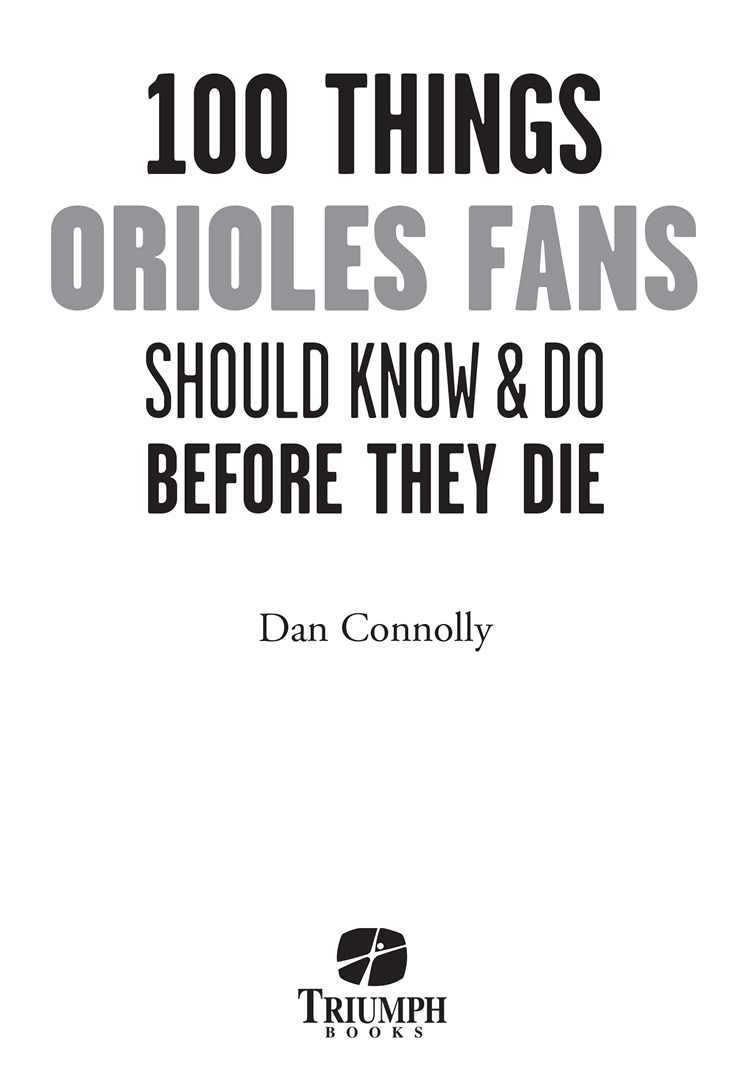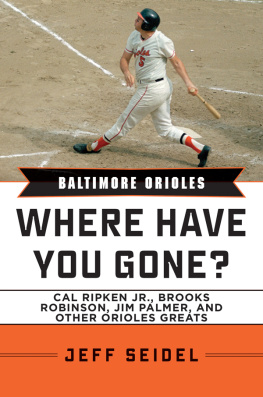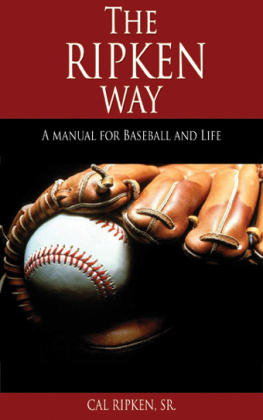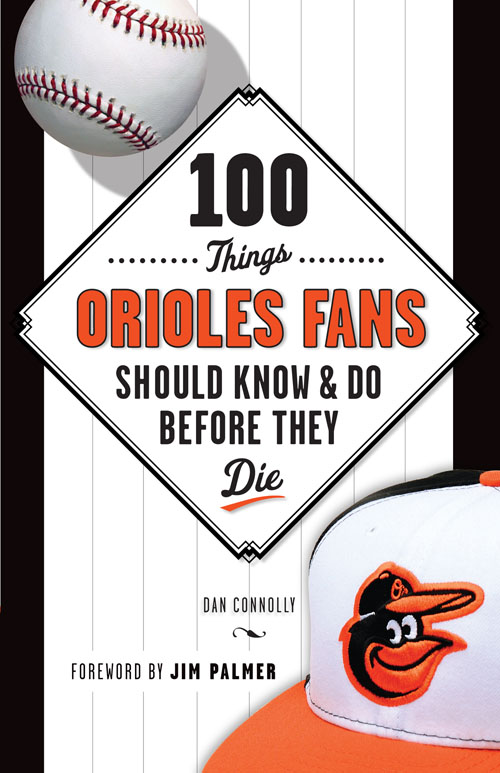
To my late mother, Ann, who taught me to love words and to laugh often.
To my dad, Jerry Sr., who taught me about hard work and baseball, in that order.
To my four siblings, Jerry Jr., Chuck, Ann, and Marnie, who taught me what I initially needed to know about the Orioles and life.
And to my wife, Karen, and my children, Alex, Annie, and Grace, who teach me about life and love every single day.
Contents
Foreword by Jim Palmer
I played for almost 20 yearscounting time on the disabled listall with the Orioles. And we had the best winning percentage in baseball during that time. We didnt win all of our World Series, but we won half. And we were in six. We made the playoffs two other times. So being an Oriole was about continuity. And when you played for Cal Ripken Sr. in the minors, it was all about doing things the right way, The Oriole Way.
It sounds funny now, but you are 18 years old, and you are making $414.14 every month after taxes. During my first year playing professionally, I think I made $2,039. So obviously everybody wanted to go to the next level. I learned that to do thatto get to the next levelyou had to be a good teammate. Cal Sr. helped me understand that. Its not about practice; it is about perfect practice. There are no such things as shortcuts. You had a lot of guyslike Davey Leonhard, Eddie Watton the same page as you were going forward.
So I feel very fortunate to have played with the Orioles and I played here at the right time. I had Hall of Famer Robin Roberts as my first roommate, even though he was only there for about three months after my debut. He helped me. And I sat in the bullpen with guys like Harvey Haddix and Stu Miller and Sherm Lollar and Charlie Lau and John Orsino, guys who had been around a little bit. And then there was Dick Hall. When I got to the big leagues, you had to run and condition on your own, and the only guy who really ran was Dick Hall. So we became friends, and he became the godfather of my oldest daughter, Jamie, and my kids grew up with his kids.
I got here at the right time. We had continuity and we had great coaches. We had continuity in the way players were taught. The Oriole Way was to sign talented players, to coach them up, to have a commonality of teamwork and work ethic. Cal Sr. used to tell us, We are never going to let anybody outwork us. You can have fun. But you have to have a passion of getting better every day. And Earl Weaver certainly had a lot to do with that. He was an easy guy to play for because we won. But he was not an easy guy in that he expected you to be maybe even better than you were. And if you were already pretty good, it made for some difficulties.
But we had a great organization. We developed guys. We had a lot of guys who knew the game and would go on to manage: Jimmy Frey, Billy Hunter, Davey Johnson. George Bamberger managed two teams. The Oriole Way was the universal way. Maybe the New York Yankees were doing a similar thing, but we werent a large-market team. And yet every year we seemed to be playing really competitive baseball.
The great thing about playing professional sports when you are young is you can look around and say, Okay, who do I want to be like? And when I looked at the Orioles when I came up, I was like, Geez, who could be better than Brooks Robinson? Good guy, everybody likes him. Great player. Great personality. Some other players come in and are nice on Monday but are total jerks the other six days. And you figure in the same amount of time, you can be nice to people. Part of the process of being here in Baltimore so many years is that I have had a lot of role models, people to emulate. Robin Roberts probably knew I was going to take his place. I was 19, and he was 38. And yet he told me everything I needed to know, so it was a great lesson.
It gave me great pleasure to win 20 games eight times and to win three Cy Young Awards, but it gave me just as much pleasure to mentor the younger guys and see them go out there and make our lives easier and keep the tradition going. You did pitch for the name on the front of your uniform and not the one on the back. Because you won. It didnt have to be about you. It was always about us.
Jim Palmer
Introduction
Whenever my wife and I take our kids out for an undisclosed treat, I always tell them were going to a broccoli farm. Its my way of creating a little suspense for our trip while keeping the expectations low. I mean, no kid wants to go pick broccoli or take a bunch home. Therefore, once we arrive at our actual destination, its met with excitement and relief. We avoided the broccoli farm again. I come by this misdirection ploy honestly.
My dad did the same thing, only we lived just north of Baltimore City; broccoli farms werent a plausible option. So my dad would pack us up for a trip to the grocery store, my aunts house, or maybe the dentists office. As we traveled down Loch Raven Boulevard, passing the grocery store and the dentists and not turning left to my aunts, Id start looking out the passenger-side window. As soon as towering light poles loomed in the west, Id celebrate because I then knew we were heading to Memorial Stadium to watch the great Orioles teams of the mid-1970s to the early 1980s. That was the ultimate treat for me. We attended a lot of games during those years. The stadium was close, the seats were cheap, and the baseball was thrilling.
Back then I had no idea where life would lead me. Now I consider those days as sort of an early internship. I ate peanuts in the bleachers with my father and mother or tagged along with my older sisters in the upper deck. (Theyd hang out in raucous Section 34 while I was relegated to sit by myself a few sections over and not tell my mom and dad what I had heard, saw, or smelled.) It was definitely on-the-job training. Years later, I became a sportswriter. In 2001 I began covering the Orioles full time. In 2005 my hometown newspaper, The Baltimore Sun , hired me to keep writing about baseball. So when I was asked to do this book, it seemed like a natural fit. Id been around the Orioles most of my life. I remember Tito Landrums homer, John Shelbys throw, and that make-your-skin-crawl Sister Sledge song. I figured I knew all I needed to know about the Orioles to write a book. I was completely wrong. As my research mounted and I talked to many of the men who shaped the franchise, I discovered stories I had never heard before, or had long forgotten, anyway. It was absolutely fascinating for me.
One thing I knew going in was that finding 100 interesting things to write about wouldnt be difficult. The Orioles have a deep, rich history of winning. And in the years they were bad, they were rarely boring. My biggest challenge became figuring out what to include and what to omit. Yes, the 1980 Orioles won 100 games and didnt make the playoffs, and thats intriguing. But Orioles reliever Alan Mills once had a poster of Darryl Strawberry in his college dorm room and years later famously punched Straw in the jaw. Sorry, 1980 team, you came up short again. Theres plenty of room here for friendly debateslike the ordering of the chapters. How do you correctly put all these instrumental people and events into a one to 100 order? It really became tricky after about No. 25 or so and impossible by No. 50. For instance, should Gus Triandos be listed ahead of Mike Mussina? I thought yeshe was the clubs first real starbut maybe not. Thats what makes this whole concept so cool. Ultimately, I assembled the content in a way I thought would be both entertaining and informing.





